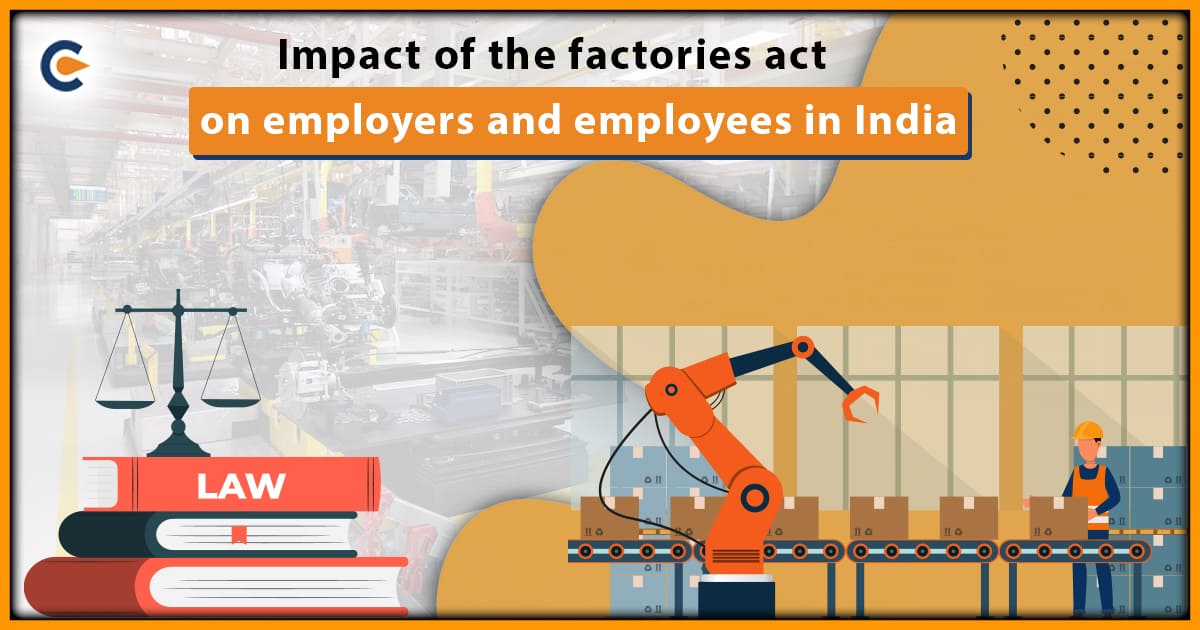The production of goods is an unavoidable component of any country’s economy. Without a doubt, everything that is involved in production must also be vital. As a result, the factory plays a significant role in the economy. Therefore factories Act was enacted to protect workers from any unfair work conditions. The term factory always goes hand in hand with health and safety, and they are the need of the hour with respect to the workplace environment in India.
Health and safety concerns are the need of the hour concerning the workplace environment. In India, codified legislation for the same has come a long way with the enactment of the Factories Act 1948, which entails the provisions for this issue. When it comes to health and safety issues, they can be said to be one of the major reasons for debate today in terms of their legislative strength and implementation, as worker well-being is paramount in the smooth functioning and progress of any industrial setup.
The expression “employee welfare” refers to a wide range of services, amenities, and benefits offered to workers in order to improve their lives. Employee welfare, as defined by the Labour Investigation Committee (1946), is anything done for the intellectual, physical, moral, or economic improvement of employees, whether by employers, the government, or other agencies, above and beyond what is typically anticipated as part of the benefits contracts for which employees may have been compensated.
In Ravi Shankar Sharma v. State of Rajasthan (1993), the Supreme Court determined that the Factory Act of 1948 is social legislation that addresses the health, safety, welfare, and other issues pertaining to factory workers.
By means of this article, the author aims to analyse the different provisions of this legislation and examine their scope with the help of case laws.
Overview of Factories Act, 1948
- Meaning of factory
The term factories have been defined under Section 2 sub-clause m. The Act says that a factory includes premises where:
- There are ten (10) or more than 10 workers working on any day of the preceding 12 months in a manufacturing unit with the aid of power; or
- There are 20 or more than 20 workers working on any day of the preceding 12 months in a manufacturing unit without the aid of power.
The term factory does not include the following;
- A mine as per the Mine Act of 1952
- A railway running shed
- Any eating place, which consists of a hotel or a restaurant
In Lal Bovta Hotel Aur Bakery Mazdoor Union v. Ritz Private Ltd. (2007), the court stated that a hotel’s establishment would not be considered to be a factory for purposes of section 2(m) of the Act.
- Historical perspective
The first Factories Act in India was passed in the year 1881. The primary aim of the Act was to protect children as well as some measures related to health and safety.
The Act of 1881 regulated the working conditions of the workers and laid down various provisions related to the workers’ health, safety, working conditions, and hazardous processes. It also provided the procedures for penalties in case of any contravention of provisions of the Factory Act of 1948. The Act was then amended in the year 1891, 1911, 1922, 1934, 1948, 1976 and 1987. Again it was extensively amended in the year 1948.
The Factory Act of 1948 is more comprehensive than the previous Acts. It focuses mainly on health, safety, the welfare of the workers inside factories, working hours, minimum age to work, leave with pay etc. This Act is based on the Factory Act of Great Britain, passed in 1937.
The objective behind passing the Factory Act of 1948 was to consolidate and amend the law regulating factory labour. It is a piece of legislation that covers all the aspects regarding factories, namely: approval licensing and registration of factories, the inspecting authorities, health, safety, welfare, working hours of the employees, employment of workers-adult and young children, annual leave and penalties, etc.
The provisions of this Act are applicable to all factories within the Indian Territory unless excluded by any State Government or Central Government[1]. The benefit of the Act applicable to workers who are covered under the Act.
- Some Important section
Before we start talking about the impact of the factories act, let us look at some important sections related to the employers and employees of a factory, and these are as follows:
Under Chapter I – PRELIMINARY
- Section 4 of the Factories Act of 1948 talks about the power to declare different departments to be separate factories or two or more factories to be a single factory.
- Section 5 of the Factories Act of 1948 talks about the power to exempt during public emergency.
- Section 6 of the Factories Act of 1948 talks about the approval, licensing and registration of factories.
- Section 7 of the Factories Act of 1948 talks about the notice by occupier.
Under Chapter II – THE INSPECTING STAFF
- Section 7A of the Factories Act of 1948 talks about the general duties of the occupier.
- Section 7B of the Factories Act of 1948 talks about the general duties of manufacturers, etc., as regards articles and substances for use in factories.
- Section 8 of the Factories Act of 1948 talks about the inspectors.
- Section 9 of the Factories Act of 1948 talks about the powers of Inspectors.
Under Chapter III – HEALTH
- Section 11 of the Factories Act of 1948 talks about the cleanliness.
- Section 12 of the Factories Act of 1948 talks about the disposal of wastes and effluents.
- Section 13 of the Factories Act of 1948 talks about the ventilation and temperature.
- Section 14 of the Factories Act of 1948 talks about the dust and fume
- Section 16 of the Factories Act of 1948 talks about the overcrowding.
- Section 17 of the Factories Act of 1948 talks about the lighting.
- Section 18 of the Factories Act of 1948 talks about the drinking water.
- Section 19 of the Factories Act of 1948 talks about the urinals.
- Section 20 of the Factories Act of 1948 talks about the spittoons.
Under Chapter IV – SAFETY
- Section 23 of the Factories Act of 1948 talks about the employment of young persons on dangerous machines.
- Section 24 of the Factories Act of 1948 talks about the striking gear and devices for cutting off power.
- Section 27 of the Factories Act of 1948 talks about the prohibition of employment of women and children near cotton-openers.
- Section 36 of the Factories Act of 1948 talks about the precautions against dangerous fumes, gases, etc.
- Section 36A of the Factories Act of 1948 talks about the precautions regarding the use of portable electric light.
- Section 37 of the Factories Act of 1948 talks about the explosive or inflammable dust, gas, etc.
- Section 38 of the Factories Act of 1948 talks about the precautions in case of fire
Under Chapter IVA – PROVISIONS RELATING TO HAZARDOUS PROCESSES
- Section 41A of the Factories Act of 1948 talks about the Constitution of Site Appraisal Committee.
- Section 41B of the Factories Act of 1948 talks about the compulsory disclosure of information by the occupier.
- Section 41C of the Factories Act of 1948 talks about the specific responsibility of the occupier in relation to hazardous processes.
- Section 41D of the Factories Act of 1948 talks about the power of Central Government to appoint Inquiry Committee.
- Section 41E of the Factories Act of 1948 talks about the emergency standards.
- Section 41F of the Factories Act of 1948 talks about the permissible limits of exposure of chemical and toxic substances.
- Section 41G of the Factories Act of 1948 talks about the workers’ participation in safety management.
- Section 41H of the Factories Act of 1948 talks about the right of workers to warn about imminent danger.
Under Chapter VI – WORKING HOURS OF ADULTS
- Section 51 of the Factories Act of 1948 talks about the weekly hours.
- Section 52 of the Factories Act of 1948 talks about the weekly holidays.
- Section 53 of the Factories Act of 1948 talks about the compensatory holidays.
- Section 54 of the Factories Act of 1948 talks about the daily hours.
- Section 55 of the Factories Act of 1948 talks about the intervals for rest.
- Section 56 of the Factories Act of 1948 talks about the spread over.
- Section 57 of the Factories Act of 1948 talks about the night shifts.
- Section 58 of the Factories Act of 1948 talks about the prohibition of overlapping shifts.
- Section 59 of the Factories Act of 1948 talks about the extra wages for overtime.
- Section 60 of the Factories Act of 1948 talks about the restriction on double employment.
- Section 61 of the Factories Act of 1948 talks about the notice of periods of work for adults.
- Section 62 of the Factories Act of 1948 talks about the register of adult workers.
- Section 63 of the Factories Act of 1948 talks about the hours of work to correspond with notice under section 61 and register under Section 62.
- Section 64 of the Factories Act of 1948 talks about the power to make exempting rules.
- Section 65 of the Factories Act of 1948 talks about the power to make exempting orders.
- Section 66 of the Factories Act of 1948 talks about the restrictions on employment of women.
Under Chapter VII – EMPLOYMENT OF YOUNG PERSONS
- Section 67 of the Factories Act of 1948 talks about the prohibition of employment of young children.
- Section 71 of the Factories Act of 1948 talks about the working hours for children.
- Section 72 of the Factories Act of 1948 talks about the notice of periods of work for children.
- Section 73 of the Factories Act of 1948 talks about the register of child workers.
- Section 74 of the Factories Act of 1948 talks about the hours of work to correspond with notice under Section 72 and register under Section 73.
- Section 75 of the Factories Act of 1948 talks about the power to require medical examination.
Under Chapter VIII – ANNUAL LEAVE WITH WAGES
- Section 79 of the Factories Act of 1948 talks about the annual leave with wages.
- Section 80 of the Factories Act of 1948 talks about the wages during leave period.
- Section 81 of the Factories Act of 1948 talks about the payment in advance in certain cases.
- Section 82 of the Factories Act of 1948 talks about the mode of recovery of unpaid wages.
Under Chapter X – PENALTIES AND PROCEDURE
- Section 92 of the Factories Act of 1948 talks about the general penalty for offences.
- Section 93 of the Factories Act of 1948 talks about the liability of owner of premises in certain circumstances.
- Section 94 of the Factories Act of 1948 talks about the enhanced penalty after previous conviction.
- Section 95 of the Factories Act of 1948 talks about the penalty for obstructing Inspector.
- Section 96 of the Factories Act of 1948 talks about the penalty for wrongfully disclosing results of analysis under Section 91.
- Section 97 of the Factories Act of 1948 talks about the offences by workers.
- Section 98 of the Factories Act of 1948 talks about the penalty for using false certificate of fitness.
Licensing and registration under the Act
The occupier of a factory has to obtain prior permission/licence from the state government or the relevant inspector of factories to operate a factory.
Section 6 of the act authorises the state government to frame rules regarding approval, licensing and registration of factories in order that compliance with the provisions relating to health, safety and welfare can be ensured. Plans and specifications have to be submitted for this along with the prescribed fee.
Documents required during the process of registration
Mentioned below is the list of documents required during the process of registration:
- A certificate of consent is needed if you are planning to operate in state of J&K from J&K State Pollution Control Board.
- In case he application is planning to open sawmills, peeling of wood logs factories, explosive factories, arms and ammunition factories, drug and pharmaceuticals factories, brick kilns and stone crushers, then they must obtain a NOC from the concerned department.
- Authorization letter from the occupier.
- A copy of the power sanction certificate from Power Development Department.
- A copy of safety certificate which should include safety measures adopted within the factory.
- A passport-size photog of the manager or the occupier.
- Government-authorised ID proof of the
Recent developments around the Act
The definition of a factory determines whether the Factories Act of 1948 is applicable or not on the premises.
The Factories Act of 1948 has been amended by numerous state governments in India due to the severe economic effects of the COVID-19 outbreak. The proposed changes raised the number of workers required to qualify as a factory under the Act’s applicability definition. The changes were implemented by the respective state governments of Assam on June 30, 2020, Bihar on July 2, Gujarat on July 2, Himachal Pradesh on July 9, Haryana on July 20, and Karnataka on July 31, 2020, through an ordinance. The modifications enhance the bar for applying the Act from the current 10 workers to the new threshold of 20 workers for factories operating with the aid of power and from the existing 20 workers to the new threshold of 40 workers for factories operating without the aid of power.
The modifications are anticipated to lessen the burden of compliance since factories that do not satisfy the minimum number of workers needed by the relevant State’s Ordinance would no longer be obliged to register. Additionally, this will promote the construction of new factories and boost production, making up for the missed window of opportunity and time.
Conclusion
The existence of the factory system was the outcome of the industrial revolution. The welfare measures under the Factory Act of 1948 are designed for the benefit and welfare of the workers. By putting the different provisions of the Act into practise, it seeks to protect the interest of factory workers and to ensure their welfare while they are at work. The Act is meant to provide protection to the workers from being exploited by the greedy business establishments and also provides for improvements of working conditions within the factory premises by imposing upon the owner or occupier certain obligations.
Read our Article: Factories Act 1948: Scope, Norms, And Amendments













